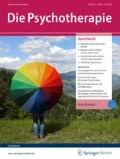Zusammenfassung
Das „pervasive refusal syndrome“ (PRS) wurde erstmals 1991 von Lask et al. als eigenständiges Störungsbild bei Kindern und Jugendlichen diskutiert. Symptome sind eine potenziell lebensbedrohliche Verweigerung von Nahrungsaufnahme, Kommunikation, Bewegung, Körperhygiene, Selbstfürsorge und Teilhabe an Alltagsaktivitäten, ohne dass es eine somatische Erklärung hierfür gibt. Der Widerstand kann sich sowohl aktiv als auch passiv gestalten. Hilfe/Behandlungsangebote werden nicht angenommen. Dargestellt werden die Kasuistik eines Mädchens mit PRS, im Einzelnen der Verlauf der Erkrankung sowie der Behandlung aus Sicht der Patientin und der Behandler. Wirksame Therapieelemente sollen anhand der Fallbeschreibung einander gegenübergestellt werden.
Abstract
Pervasive refusal syndrome (PRS), as a new psychiatric disorder among children and adolescents, was first described 1991 by Lask et al. It is characterized by a determined refusal of the child to eat, talk, walk, care for themselves or participate in daily activities. An organic explanation for the symptoms is absent. The observed refusal of functions can be either active or passive. Children also demonstrate a clear resistance to help or treatment. This paper presents a case study that depicts PRS from the therapists’ and the patients’ viewpoint and helpful elements in therapy are evinced from both points of view.




Notes
Internationale statistische Klassifikation der Krankheiten und verwandter Gesundheitsprobleme, 10. Aufl.
Selektive Serotonin-Wiederaufnahmehemmer.
Literatur
Guirguis S, Reid C, Rao S et al (2011) Follow-up study of four cases of pervasive refusal syndrome. Eur Child Adolesc Psychiatry 20:271–274
Jans T, Ball J, Preiss M et al (2011) Pervasive refusal syndrome. Three German cases provide further illustration. Z Kinder Jugendpsychiatr Psychother 39(5):351–359
Jaspers T, Hanssen GM, Valk JA van der et al (2009) Pervasive refusal syndrome as part of the refusal-withdrawal-regression spectrum: critical review of the literature illustrated by a case report. Eur Child Adolesc Psychiatry 18:645–651
Lask B (2004) Pervasive refusal syndrome. Adv Psychiatr Treat 10:153–159
Lask B, Britten C, Kroll L et al (1991) Children with pervasive refusal syndrome. Arch Child Psychol Psychiatry 36:191–202
Nunn KP, Thompson SL, Moore SG et al (1998) Managing pervasive refusal syndrome: strategies of hope. Clin Child Psychol Psychiatry 3(2):229–250
Nunn KP, Thompson SL (1996) The pervasive refusal syndrome: learned helplessness and hopelessness. Clin Child Psychol Psychiatry 1:121–132
Nunn KP, Lask B, Owen I (2014) Pervasive refusal syndrome (PRS) 21 years on: a re-conceptualisation and a renaming. Eur Child Adolesc Psychiatry 23:163–172
Wright B, Beverley D (2011) Pervasive refusal syndrome. Clin Child Psychol Psychiatry 17(2):221–228
Von Folsach LL, Montgomery E (2006) Pervasive refusal syndrome among asylum-seeking children. Clin Child Psychol Psychiatry11(3):457–473
Thompson SL, Nunn KP (1997) The pervasive refusal syndrome: The Royal Alexandra Hospital for Children experience. Clin Child Psychol Psychiatry 2(1):145–165
Einhaltung ethischer Richtlinien
Interessenkonflikt. Isabel Boege, Christoph Möhrle, Jörg M. Fegert und Renate Schepker geben an, dass kein Interessenkonflikt besteht. Alle Patienten, die über Bildmaterial oder anderweitige Angaben innerhalb des Manuskripts zu identifizieren sind, haben hierzu ihre schriftliche Einwilligung gegeben. Im Fall von nichtmündigen Patienten liegt die Einwilligung eines Erziehungsberechtigten oder des gesetzlich bestellten Betreuers vor.
Author information
Authors and Affiliations
Corresponding author
Rights and permissions
About this article
Cite this article
Boege, I., Möhrle, C., Fegert, J. et al. „Pervasive refusal syndrome“. Psychotherapeut 59, 356–362 (2014). https://doi.org/10.1007/s00278-014-1074-0
Published:
Issue Date:
DOI: https://doi.org/10.1007/s00278-014-1074-0

